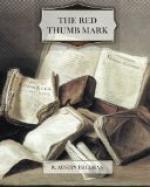He glanced quickly through the entries in the two books, referring back once or twice, and stood for a few moments silent and abstracted. Then he laid the little books down on the table with a satisfied nod.
“Our information, then,” he said, “amounts to this: Reuben is an industrious worker at his business and, in his leisure, a student of ancient and medieval art; possibly a babbling fool and a cad or, on the other hand, a maligned and much-abused man. “Walter Hornby is obviously a sneak and possibly a liar; a keen man of business, perhaps a flutterer round the financial candle that burns in Throgmorton Street; an expert photographer and a competent worker of the collotype process. You have done a very excellent day’s work, Jervis. I wonder if you see the bearing of the facts that you have collected.”
“I think I see the bearing of some of them,” I answered; “at least, I have formed certain opinions.”
“Then keep them to yourself, mon ami, so that I need not feel as if I ought to unbosom myself of my own views.”
“I should be very much surprised if you did, Thorndyke,” I replied, “and should have none the better opinion of you. I realise fully that your opinions and theories are the property of your client and not to be used for the entertainment of your friends.”
Thorndyke patted me on the back playfully, but he looked uncommonly pleased, and said, with evident sincerity, “I am really grateful to you for saying that, for I have felt a little awkward in being so reticent with you who know so much of this case. But you are quite right, and I am delighted to find you so discerning and sympathetic. The least I can do under the circumstances is to uncork a bottle of Pommard, and drink the health of so loyal and helpful a colleague. Ah! Praise the gods! here is Polton, like a sacrificial priest accompanied by a sweet savour of roasted flesh. Rump steak I ween,” he added, sniffing, “food meet for the mighty Shamash (that pun was fortuitous, I need not say) or a ravenous medical jurist. Can you explain to me, Polton, how it is that your rump steak is better than any other steak? Is it that you have command of a special brand of ox?”
The little man’s dry countenance wrinkled with pleasure until it was as full of lines as a ground-plan of Clapham Junction.
“Perhaps it is the special treatment it gets, sir,” he replied. “I usually bruise it in the mortar before cooking, without breaking up the fibre too much, and then I heat up the little cupel furnace to about 600 C, and put the steak in on a tripod.”
Thorndyke laughed outright. “The cupel furnace, too,” he exclaimed. “Well, well, ’to what base uses’—but I don’t know that it is a base use after all. Anyhow, Polton, open a bottle of Pommard and put a couple of ten by eight ‘process’ plates in your dark slides. I am expecting two ladies here this evening with a document.”
“Shall you bring them upstairs, sir?” inquired Polton, with an alarmed expression.




